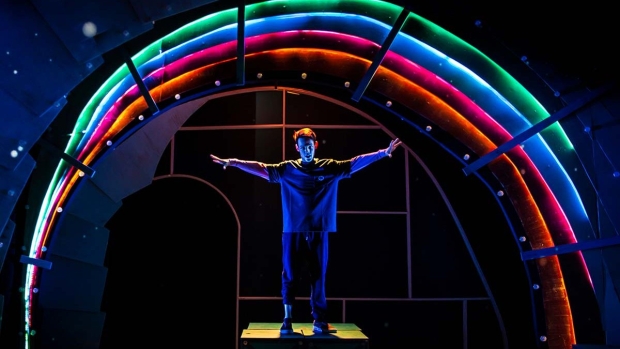”A-Typical Rainbow” at the Turbine Theatre – review

© Pamela Raith
In A-Typical Rainbow, the new play debuting at the Turbine Theatre in Battersea, writer and star JJ Green offers a heartfelt, and at times traumatising, coming out story. Not in the usual sense, however, though a queer coming of age subplot takes place, the most significant social closeting the semi-autobiographical protagonist must emerge from is an autism diagnosis.
A staunch advocate for neurodivergent representation in theatre, Green recalls events from his own lived experience as well as the lives of others in the autistic community to create a story which sidesteps between beautiful fantasy and dampening reality. At the particular performance I attended, however, Green shared the starring role in his own life story with another actor, Conor Joseph, an understudy who stepped in halfway through the play’s first act. Both Joseph and Green give so much of themselves to the audience in their performances, providing illuminating insights into the character’s perspective as well as a cutting sense of humour and a playful tendency for decadent metaphors. It is a challenging performance that follows the boy from age 7 to adulthood via a series of distressing developmental episodes.
If stories such as these need a secondary character to offer an alternative, outside viewpoint, here it is Caroline Deverill as the boy’s anxious and frustrated mother who wrestles with difficult choices over how to raise her son. Despite its tendency to break into fantasy, Deverill’s performance grounds the show in its harsh reality as she weighs moral dilemmas with heart-breaking depth.
The play has been penned with much skill, its self-referential nature is quite characteristic of an Edinburgh Fringe show and a queer romance which blossoms in the second act is not only brilliantly written but exudes euphoria in its staging and performance. And yet the narrative is inconsistently framed, it is as though Green and the creatives were faced with a handful of choices as to how the story might best be depicted and found it impossible to pick. This makes it challenging for an audience to derive the message at various key points, even the boy’s mother’s agonising choice over how to prepare her son for an ill-accommodating world is lost in a dizzying flashback sequence.
Moments of Bronagh Lagan’s staging seem to closely pay tribute to the striking movement direction in The Curious Incident of the Dog in the Night-Time, another play which offers insight into an autistic character’s unique world, which is even alluded to in Green’s script. Though Max Alexander-Taylor’s compositions instil tremendous atmosphere, it is sometimes at the expense of clarity as the actors have not been provided with microphones; those that can project about the deliberately jarring soundscapes are heard and those that cannot aren’t. Credit is due to the creative team, however, as the show has been made to fit far better into the challenging Battersea playing space than most of its previous tenants.
An objectively and hugely important piece of theatre and one that is long overdue, that it is being produced and exists for autistic audiences to connect with is cause enough for celebration. The play’s narrative gives unparalleled agency to its autistic protagonist, and its message light-footedly unpicks stigmas and untruths about autism. Furthermore, all of it is the work of a largely neurodivergent cast and creative team, one that has been given the opportunity to share this story with complete authenticity.












